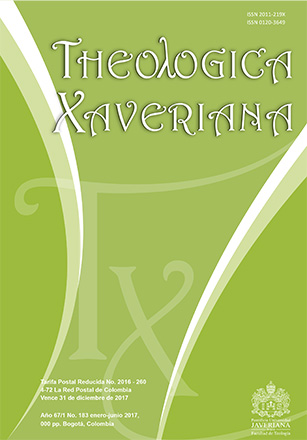Abstract
La historia, elemento fundamental del cristianismo por la dinámica misma de la encarnación, fue relegada a un segundo plano por la teología abstracta de la neoescolástica. Contrariamente a tal teología, el padre Marie- Dominique Chenu, O. P. (1895-1990) atiende al dato revelado y al nuevo contexto social en la predicación del Evangelio. Su teología crece en la tradición de la Iglesia al tiempo que es consciente de las problemáticas que aquejan a la sociedad industrializada. El artículo propone el concepto de “función concienciadora de la historicidad en la teología” como clave interpretativa de las investigaciones medievales y contemporáneas de Chenu.
Alberigo, Giuseppe. “Christianisme en tant qu’histoire et ‘théologie confesante’”. En Une école de théologie: Le Saulchoir, editado por G. Alberigo, 11-35. Paris: Du Cerf, 1985.
Biffi, Inos. “Marie-Dominique Chenu (1895-1990)”. Credere oggi. Edizioni Messagero di Padova, http://www.credereoggi.it/upload/2003/articolo134_59.asp (consultado el 21 de julo de 2012).
_____. “Presenza e influsso di M.-D. Chenu in Italia”. RSPT 75 (1991): 469-489.
Bonanni, Sergio Paolo. “Parlare della Trinità. Lettura della Theologia Scholarium di Abelardo”. Tesis de Doctorado, Pontificia Università Gregoriana, Roma, 1996.
Chenu, Marie-Dominique. “Consecratio mundi”. Nouvelle Revue Théologique 86 (1964): 608-618. Disponible en: Selecciones de teología, http://www.seleccionesdeteologia.net/selecciones/llib/vol5/19/019_chenu.pdf (consultado el 10 de febrero de 2014).
_____. El Evangelio en el tiempo. Barcelona: Estela, S. A., 1966.
_____. ¿Es ciencia la teología? Andorra: Casal i Vall, 1959.
_____. Hacia una teología del trabajo. Barcelona: Estela, S. A., 1960.
_____. “Historicidad e inmutabilidad del ser cristiano”. En El ateísmo contemporáneo, Vol. 4, dirigido por G. Girardi, 151-166. Madrid: Cristiandad, 1971.
_____. Il risveglio della coscienza nella civiltà medievale. Milano: Jaca Book, 1991.
_____. La doctrine sociale de l’Église comme idéologie. Paris: Du Cerf, 1979.
_____. La fe en la inteligencia. Bibliografía general de padre Chenu 1922-1965. Barcelona: Estela, 1966.
_____. “La teología del trabajo frente al ateísmo”. En El ateísmo contemporáneo, Vol 4, dirigido por G. Girardi, 295-309. Madrid: Cristiandad, 1971.
_____. La teología nel XII secolo. Milano: Jaca Book, 1999.
_____. “Le lieux théologiques chez Melchior Cano”. En Le point théologique. Le déplacement de la théologie. En actes du Colloque Méthodologique de février 1976, editado por Institute Catholique, 45-50. Paris: Beauchesne, 1977.
_____. “Les événements et le royaume de Dieu”. ICI 250 (1965): 18-19.
_____. “Les signes des temps“. NRT 97 (1965): 29-39. Disponible en: Selecciones de teología, http://www.seleccionesdeteologia.net/selecciones/llib/vol4/16/016_ chenu.pdf (consultado el 10 de febrero de 2014).
_____. “L’inteligenza della fede o Abelardo, il primo uomo moderno”. En Il risveglio della coscienza nella civiltà medievale, por M-D. Chenu, 69-86. Milano: Jaca Book, 1991.
_____. “Trabajo”. En Sacramentum Mundi VI, 672-684. Barcelona: Herder, 1975.
_____. “Une école de théologie: Le Saulchoir”. En Une école de théologie: Le Saulchoir, editado por G. Alberigo, 93-176. Paris: Du Cerf, 1985.
Duval, André. “Bibliographie du P. Marie-Dominique Chenu (1921-1965)”. En Mélanges offerts à M.D. Chenu Maître en Théologie, 9-29. Bibliotèque Thomiste 37. Paris: J. Vrin, 1967.
Eckholt, Margit. La Iglesia en la diversidad. Santiago de Chile: Ediciones Universidad Alberto Hurtado, 2007.
Faggioli, Massimo. “Vatican II and the Church of the Margins”. Theological Studies 74 (2013): 808-818.
Gallo, Luis Antonio. La concepción de la salvación y sus presupuestos en Marie-Dominique Chenu. Biblioteca di Scienze Religiose 18. Roma : Librería Ateneo Salesiano, 1977.
Maritain, Jacques. Les droits de l’homme et la loi naturelle. Paris: Éditions de la Maison Française Inc., 1945.
Marx, Karl. Cuadernos de Paris. (Notas de lectura de 1844). México: ERA, 1974.
_____. Manuscritos de economía y filosofía. Madrid: Alianza, 1979.
Mazzarello, María Luisa. “Gli scritti del p. Marie-Dominique Chenu 1963-1979”. Salesianum 42 (1980): 855-866.
Mondin, Battista. Storia della teología. Vol. 4. Bologna: ESD, 1997.
Pablo VI. “Alocución del 1º de mayo de 1964. L’Osservatore romano, Roma, 2 de mayo de 1964.
Pio X. “Carta encíclica Pascendi sobre las doctrinas de los modernistas (1907)”. Vatican, http://w2.vatican.va/content/piusx/es/encyclicals/documents/hf_p-x_ enc_19070908_pascendi-dominici-gregis.html (consultado el 9 de mayo 2016).
Rosanvallon, Pierre. La nouvelle question sociale. Repenser l’Etat-providence. Paris: Du Seuil, 1995.
Schmitt, Jean-Claude. “L’oeuvre de médiéviste du père Chenu”. RSPT 81 (1997): 397-398.
Esta revista científica se encuentra registrada bajo la licencia Creative Commons Reconocimiento 4.0 Internacional. Por lo tanto, esta obra se puede reproducir, distribuir y comunicar públicamente en formato digital, siempre que se reconozca el nombre de los autores y a la Pontificia Universidad Javeriana. Se permite citar, adaptar, transformar, autoarchivar, republicar y crear a partir del material, para cualquier finalidad (incluso comercial), siempre que se reconozca adecuadamente la autoría, se proporcione un enlace a la obra original y se indique si se han realizado cambios. La Pontificia Universidad Javeriana no retiene los derechos sobre las obras publicadas y los contenidos son responsabilidad exclusiva de los autores, quienes conservan sus derechos morales, intelectuales, de privacidad y publicidad.
El aval sobre la intervención de la obra (revisión, corrección de estilo, traducción, diagramación) y su posterior divulgación se otorga mediante una licencia de uso y no a través de una cesión de derechos, lo que representa que la revista y la Pontificia Universidad Javeriana se eximen de cualquier responsabilidad que se pueda derivar de una mala práctica ética por parte de los autores. En consecuencia de la protección brindada por la licencia de uso, la revista no se encuentra en la obligación de publicar retractaciones o modificar la información ya publicada, a no ser que la errata surja del proceso de gestión editorial. La publicación de contenidos en esta revista no representa regalías para los contribuyentes.



